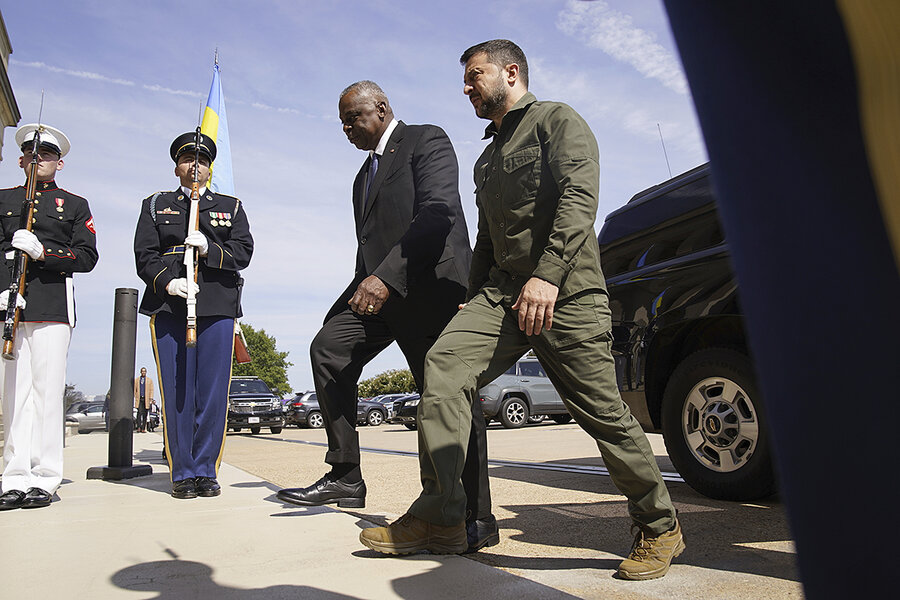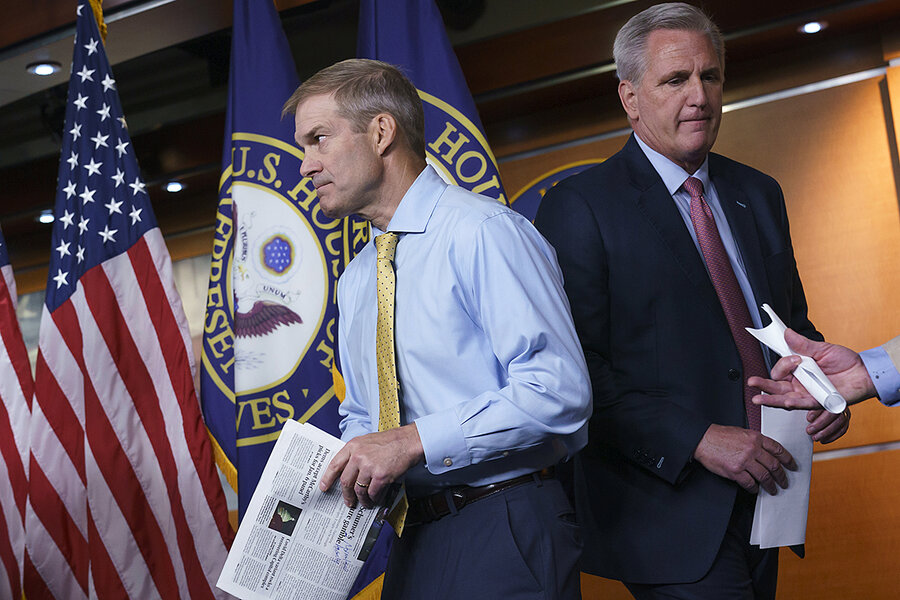As GOP faction challenges Ukraine policy, does Biden have an answer?
Loading...
Following Russia’s invasion, and backed by strong bipartisan support from Congress, President Joe Biden united Europe in defense of Ukraine’s sovereignty. In its leadership position, the United States has so far provided Ukraine $113 billion in security and economic assistance.
Advocates of America’s role as guarantor of the international order consider that a bargain. But now in Washington, a very different view of that $113 billion is taking root.
Why We Wrote This
A story focused onAmid weakening support for the Ukraine war effort, it’s a dramatic shift in Washington that has Kyiv and Western leaders most concerned. A growing minority in the House GOP rejects the aid as reflecting an outdated globalist foreign policy that fails to put America first.
Championing the effort to stop all aid is a growing minority of Republicans in the House, and as it moves to replace Kevin McCarthy as speaker, the question of U.S. aid to Ukraine is expected to loom large.
“On the Republican side ... we’re seeing two trends that stand out, neither of which is good news for the future of aid to Ukraine,” says Elizabeth Hoffman, at the Center for Strategic and International Studies in Washington. “One is the isolationist trend. ... The other is a sense that we are spending all this time and money on Ukraine, when China is the real threat.”
She is confident Congress will approve additional aid to Ukraine. But she argues that the Biden administration and Ukraine supporters in Congress are going to have to step up with robust explanations of why the aid is in America’s interests.
As Vladimir Putin launched his full-scale invasion of Ukraine in February 2022, Joe Biden rose to the defense of the postwar international order the United States built.
Backed by strong bipartisan support from Congress, President Biden tapped into the principles of America’s trans-Atlantic leadership to unite a divided and cautious Europe behind the cause of defending Ukraine’s sovereignty.
More than 18 months later, an embattled Ukraine not only retains its independence, but has also thwarted Mr. Putin’s revanchist dreams of restoring Russian control over the territory of the former Soviet Union.
Why We Wrote This
A story focused onAmid weakening support for the Ukraine war effort, it’s a dramatic shift in Washington that has Kyiv and Western leaders most concerned. A growing minority in the House GOP rejects the aid as reflecting an outdated globalist foreign policy that fails to put America first.
In its leadership position, the U.S. has so far provided Ukraine $113 billion in security and economic assistance.
Advocates of America’s role as guarantor of a rules-based international order consider that price tag a bargain. But now in Washington a very different view of that $113 billion is taking root, dimming prospects of continued robust U.S. support for Ukraine.
To be sure, cracks in the wall of Western aid to Ukraine have also surfaced in central Europe recently, notably with the victory in Slovakia’s elections Sunday of a pro-Putin populist who vows to end the NATO member’s support for Ukraine.
Still, it’s the signs of a wavering commitment in Washington that have Kyiv and Western leaders most concerned.
Championing the effort to stop all aid is a growing minority of Republicans in the House of Representatives that rejects any additional assistance, decrying it as more reckless spending and a reflection of an outdated globalist foreign policy that fails to put America first.
And as the House moves toward an election next week for a new speaker to replace Kevin McCarthy – ousted Tuesday in a historic vote in which Ukraine aid played a role – the question of U.S. aid to Ukraine is expected to again loom large.
Even as President Biden reassured Kyiv and jittery European allies this week that robust U.S. assistance will continue for “as long as it takes,” signs are growing that the House Republican majority could elect a speaker whose own refrain on Ukraine aid will be, “No more.”
If it does, it would be another historic vote, some foreign policy experts say, as it would highlight a Republican Party solidifying its flirtation with isolationism and Putin-style strongman leadership in the era of Donald Trump.
Party of Reagan
Moreover, it would signal a hardening of its turn against the brand of internationalist American leadership – employed by Mr. Biden in his Ukraine policy – that not only has enjoyed bipartisan support, but has also been a hallmark of Republican Party doctrine for decades.
“It’s frankly hard to imagine that the party of Ronald Reagan might consider abandoning a beleaguered democracy facing an unprovoked attack from an authoritarian neighbor who is also one of our major adversaries,” says Bradley Bowman, senior director of the Center on Military and Political Power at the Foundation for the Defense of Democracies in Washington.
What the House debate over Ukraine assistance has revealed is a “small but vocal minority” that sees Mr. Putin more as a model than as an adversary, says Mr. Bowman, who served for nine years on the defense and national security staffs of Republican senators.
Yet because the Republican majority in the House is so slim, and House Republicans are so divided, the “small minority” is “punching above its weight,” he adds.
Others say growing Republican opposition to Ukraine aid reflects a shifting party base that is more drawn to the “America first” of former President Trump than to traditional Republican internationalism.
That base is a key reason that a recent Reuters/Ipsos poll shows the American public’s support for aid to Ukraine slipping to around 40% – still slightly above the opponents and “don’t knows,” but an ominous sign for representatives facing elections next year.
“The bases of both major political parties have fundamentally changed over the past couple of decades, but on the Republican side ... we’re seeing two trends that stand out, neither of which is good news for the future of aid to Ukraine,” says Elizabeth Hoffman, director of congressional and government affairs at the Center for Strategic and International Studies (CSIS) in Washington.
“One is the isolationist trend, with a bit of protectionism related to China. The other,” she adds, “is a sense that we are spending all this time and money on Ukraine, when China is the real threat.”
Explanations needed
Both Ms. Hoffman and Mr. Bowman are confident Congress will approve some amount of additional aid to Ukraine in the coming weeks, citing what they say are hefty bipartisan majorities in favor in both the House and the Senate.
But they also argue that the Biden administration and Ukraine supporters in Congress are going to have to step up with robust explanations of why the aid is in America’s interests.
The way Ukraine assistance became part of the drama of Speaker McCarthy’s ouster “really has changed the game,” Ms. Hoffman says. “It’s just a reality that negotiations are going to be much tougher now.”
The administration can start by laying out a strategy for skeptical Republicans, something Ms. Hoffman says it has never done.
To reach “America-firsters,” the Biden administration can point out that a large chunk of the security assistance to Ukraine has actually remained in the U.S., for example through contracts with munitions manufacturers and other businesses in the defense industry.
“Of the total amount appropriated for Ukraine, 46% of it is staying in the U.S.,” says Ms. Hoffman, citing a recent CSIS study. “It’s just not the case that $113 billion is leaving the U.S. to support Ukraine.”
Mr. Bowman agrees, acknowledging that much of the public might be drawing incorrect conclusions about where the $113 billion is going.
“We’re not just dropping bags of cash over Kyiv,” he says. “A lot of that money is going to the American defense industry.”
Moreover, he says that spending at home has come with a “silver lining,” in that it has revealed a weakened defense manufacturing base unable to quickly fill a range of orders.
“This situation has served as a wake-up call that our defense industry needs to be bolstered,” Mr. Bowman says.
Signals to China, Europe
Some analysts argue that the support for Ukraine has actually made the U.S. better prepared to confront an increasingly aggressive China, even as it has almost certainly had an impact on Beijing. As Chinese leader Xi Jinping weighs his options on Taiwan, some say, he can’t help but have noted how U.S. support for Ukraine has left Russia stuck in a sapping quagmire.
“Before this wake-up call from the war in Ukraine, if something had happened in the Taiwan Straits to cause us to turn suddenly to our defense industry, it would have been too late,” Mr. Bowman says.
Indeed, some in Europe say that in a similar way, the signs of weakening support in Washington for Ukraine assistance are providing a necessary wake-up call to Europe that it is going to have to step up and do more.
“Certainly people in Europe understood that American assistance would diminish over time and we Europeans would have to do more for what ultimately is our responsibility,” says Sven Biscop, director of the Europe in the World Program at Egmont – The Royal Institute for International Relations in Brussels.
No one in Europe expects U.S. support for Ukraine to collapse, he says, but on the other hand the rumblings in Washington should prompt Europe to prepare to take on more of the Ukraine burden.
“We can do that in most areas if we want to,” he adds, “but right now Europe is moving too slow.”
Macron’s shift
As for signs of weakening support in Europe, Dr. Biscop says that at least as important as the domestic politics-fueled debates in places like Slovakia and Poland is the evidence of strengthening support for Ukraine in Europe’s traditional power centers, including France.
Indeed, over the course of the war French President Emmanuel Macron has shifted from a position of favoring dialogue with Mr. Putin to now promoting Ukraine’s rapid entry into NATO, moving ahead of Washington on that issue.
With the turmoil in Congress and opinion polls indicating about 8 in 10 Republican voters favor a 2024 presidential candidate who would end support for Ukraine, President Biden has his work cut out for him, Ukraine backers say.
The president appears to have gotten the message, telling reporters this week that he will soon deliver a major speech on how assistance to Ukraine serves America’s broad interests.
“It’s really important to have the president out there talking not just to Congress but to the American people about the consequences if the U.S. fails to provide support for Ukraine,” Ms. Hoffman of CSIS says. “For people who have become wary of intervention abroad,” she adds, “I think he can make the case that we are weakening an adversary without putting any boots on the ground.”










